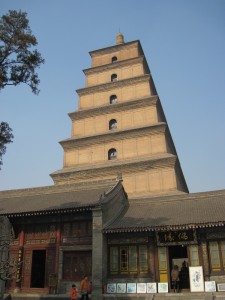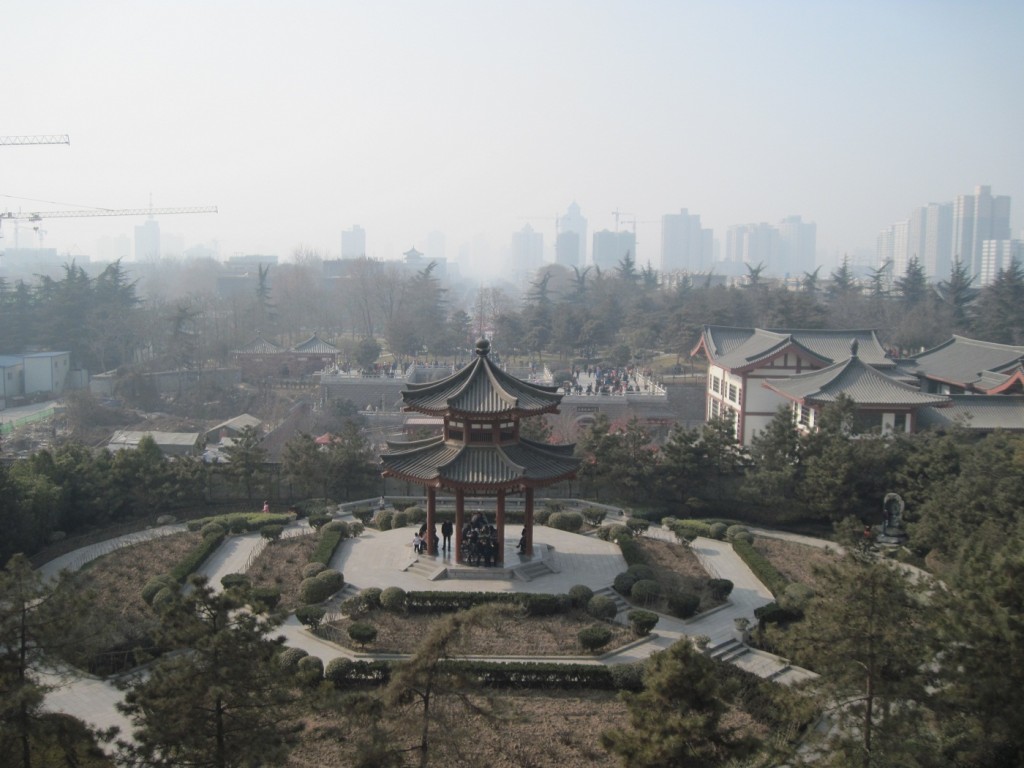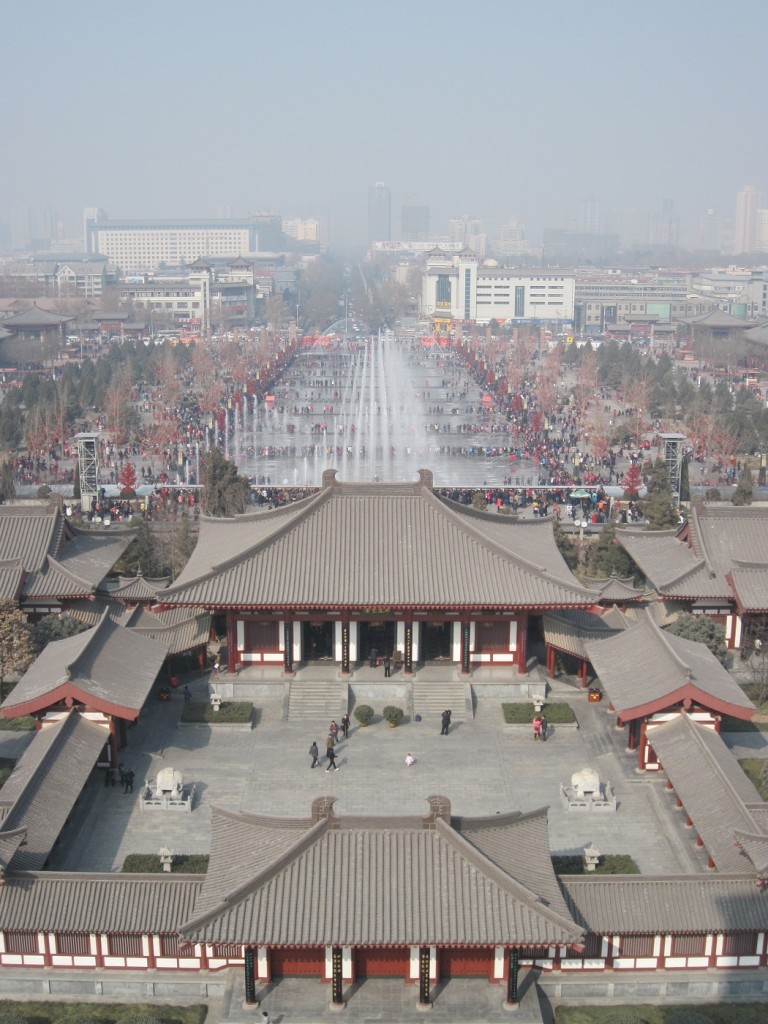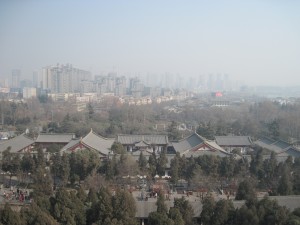
Because the "Big Wild Goose Pagoda" is a completely legitimate and not-at-all-comical name for a holy structure
This expectation was the latest manifestation of my China-intuition that I’ve been working on recently; it attempts to predict how this city will react to various things. Its most recent test was a few days ago when snow fell for the first time: I opened my door, saw the little courtyard full of snow, and had 3 thoughts: 1) Oh, it snowed, that’s pretty 2) Oh God it’s not going to be pretty once I leave this courtyard and 3) the way Beijing is going to handle snow will almost certainly be laughably labor-intensive. Before I stepped out into the street proper, the last thought that crossed my mind was — “They’re going to handle this situation the exact same way they handled it during the fucking Tang dynasty, I just know it.” The walk to work that day was a trail of gritty, yellow-brown slush being ‘cleaned up’ by dozens of people equipped solely with wicker brooms. That day I enjoyed a quiet “I told you so” moment all to myself; a day or two later someone apparently remembered that you could use salt, and snow shovels, and stuff… but that first day? All wicker, all the time.
Oh, and if you’re wondering what’s up what that picture of the Big Wild Goose Pagoda, just think of it and the 3 other pictures in this post as an apology both the length and economics-focused content that you’ll see here in a second. Plus I couldn’t think of a way to make them their own post, and I wanted this one to have pictures.
Since I’ve started playing this intuition game (a different sort of China Match, if you will), I’m one-and-one. I failed miserably to anticipate what New Years was going to be like, but pretty much nailed how people would react to snow down to the bristle. So three or four days ago when I realized Valentine’s day was coming up, I expected it to be a huge gaudy affair like it is in the states. It’s easy to commercialize, its central color is color red (everything is still red from new years! easiest thing in the world!), you can make people feel ashamed for not buying gifts… this holiday was MADE for China.
I felt so strongly that that was the case because Beijing is far and away the most advertisement-saturated city I’ve ever seen. Some of it comes in the form of billboards, plenty more in the form of people accosting you with megaphones from storefronts as you bike by. Increasingly the latter is becoming replaced by megaphones that can accost you by themselves, because they’ve been programmed to scream four seconds of grainy audio over and over. But what stands out most is the video screens. From what I’ve seen of Tokyo, even stereotypically tech-heavy Japan doesn’t quite compare. Beijing has ads on the subway proper, ones that are hundred of feet long and keep pace with the train so you can see them out the subway windows, ads in elevators, in elevator lobbies. They’re on the streets and the sides of department stores, they’re in airports and hotels, and they’re all either networked to the internet or wired to cable; when the need arises they can all play live broadcasts, like they did for the New Year’s Eve show on the day before the Spring Festival.
The message is pretty damn clear: Buy shit. Buy shit right now, and buy a lot of it.

A shot from the pagoda. So pretty you won't even mind when I start talking about history and economics, I'm sure
Now as sorta an interesting economic note, one of the reasons China has done so well since the seventies is precisely because there was a several-decade-long period where nobody in China bought anything practically at all. That’s because they were saving money at freakishly high rates because, as you might have noticed from reading the China Match, the whole country is pretty much off its rocker now, and it certainly wasn’t any better at pretty much any point during the last hundred years. It kept changing governments, and chasing governments to Taiwan, and starving thirty million people to death, and randomly sending chunks of the population to go do hard labor in the countryside (sucks if that’s your husband!), and making it so you couldn’t have more than one child to support you, and not providing any sort of social safety net to stop your old-ass self from starving on the streets or getting really sick if that singular child does not pull through, or happened to be female.
You know how some people who lived through the Great Depression spent the next few years saving a lot of money and putting it under the mattress because they remembered how quickly things can go to hell in a handbasket? China’s wild instability spooked a billion people into acting just like those guys, except that in China the state-owned banks became the nation’s collective mattress.
People put their money in the banks because they’re about as stable as you can get, and there’s not much else you could (or still can, for that matter) do with it. Your average person couldn’t get access to stocks, he couldn’t invest in bonds, he couldn’t do much of anything with it except put it in the banks. This is still largely the case, except that people have figured out that there’s a lot of property they can buy up and at the very least they can gamble a bunch, but that’s a discussion for another time.
So yes, obnoxiously high savings rates persisted for decades and all this cash got funneled into the state-owned banks, who in turn were able to lend it/give it to the state-owned corporations that were in charge of dragging China kicking and screaming into the 20th century, starting about two-thirds of the way through it. Eventually things calmed down politically, ol’ Deng Xiaoping rolled in and freed things up a little, we’re just going to ignore Tiananmen 1989, and the economy really got started by virtue of all the investment that the country had been doing. But still people kept saving, saving, saving — when the global economy had it’s little spasm in 2008, for instance, savings immediately cleared the 50% mark, because that’s the Chinese knee-jerk reaction to basically anything now — so interest rates and inflation stayed pretty damn low. So with little domestic consumption but lots of cheap labor China started trying out an export-based economy we all know how that worked out for ’em.
But here’s the thing — that’s all starting to turn around. Like, really recently. All of a sudden there’s a whole generation of people who are my age who haven’t ever known anything but boom times. Their parents are the ones saving 50% in 2008, but they’re not. The twenty, thirty-year-old urban population is starting to make some money and they are confident in China’s future, so they’re starting to consume a whole whole bunch. And who better to guide this consumption than — you guessed it — the Chinese Communist Party, who are incidentally the ones controlling all the networks and all the aforementioned video screens which is how this all ties back in. They really want to grow the domestic economy (the value of the currency is starting to appreciate so their exports are becoming more expensive for other people to buy, for one thing) and the way they’re doing it is by flooding the city with a truly obnoxious amount of advertising.
And it’s working. It’s working so well, it’s baffling. Because it’s all so new, and because people my age are just starting to make and spend money, and because a huge amount of young people in Beijing have recently migrated here from the countryside, nobody tunes out advertisements in quite the same way Americans do. Like, put a tv screen on a New York subway and have it play the same five advertisements in a 4-minute loop and it would get the shit ignored out it immediately. But in Beijing, people — not everyone, but a really healthy amount of people — will just sit and watch. Over and over. And then they BUY the stuff.Take, for instance, a KFC ad that I’m going to put up sometime later this week if I can find it. It’s about fifteen seconds long. Here’s how it goes:
Shot one: woman sitting in KFC in some random ancient egyptian (?) costume takes a bite of KFC’s new fried shrimp. “This is really good to eat!” She exclaims.
Shot two: the pirate sitting across the table from her yells (Yeah, yells. These things all have little speakers) “TOO GOOD TO EAT!”
Shot three: the pirate and woman seem confused as you hear just someone screaming “WAGHHHHHHHHHHHHHH”
Shot four: they investigate, and it’s a guy in a full body cast in the next room, eating the shrimp.
Shot five: closeup of shrimp
End.
That’s it, that’s all. You can always tell when the ad plays because most of it is legitimately just screaming. My reaction to this ad was “if I ever meet an offical of Yum Foods I will stab him in the ears so that he may know my pain.”
But not so for your average Chinese, who literally just eat it up. Every time I walk past a KFC, everyone is eating plates of these shrimp.
So what the hell is up with the no-V-day thing? They have the capacity to advertise anywhere and change the ads instantaneously via network, the ads are effective, you already have people thinking about holidays and red things, it’s an easily shame-able population of a billion. What more can you ask for?
A picture of some fountains, that’s what.

« Muslim quarter, drum & bell towers Photoblog — Lantern Festival »


THIS IS ALL REALLY INTERESTING…AND EXTREMELY APPLICABLE TO THE MULTI-NATIONAL MARKETING CLASS I’M CURRENTLY TAKING. HAHA. I WONDER WHAT THE CONNECTION IS BETWEEN ANCIENT EGYPT AND FRIED SHRIMP…?
The reason they don’t do Valentine’s day probably has to do with overt displays of sexuality/commerce being generally anathema to the CCP. Do you remember that dating show where the girl was like “I would rather cry in a BMW than be happy in a bad car” and how quickly that shit got shut down?
Correct or not, the CCP seems convinced that their power is at least partially derived from their ability to uphold “morality” within the state. So that’s my guess.
Loved the ending.
please post that commercial.
connor is probably right about vday…that makes sense.
I WANT THE COMMERCIAL, TOO! I SPENT A FAIR AMOUNT OF TIME LOOKING FOR IT ON YOUTUBE, BUT COULDN’T FIND IT…